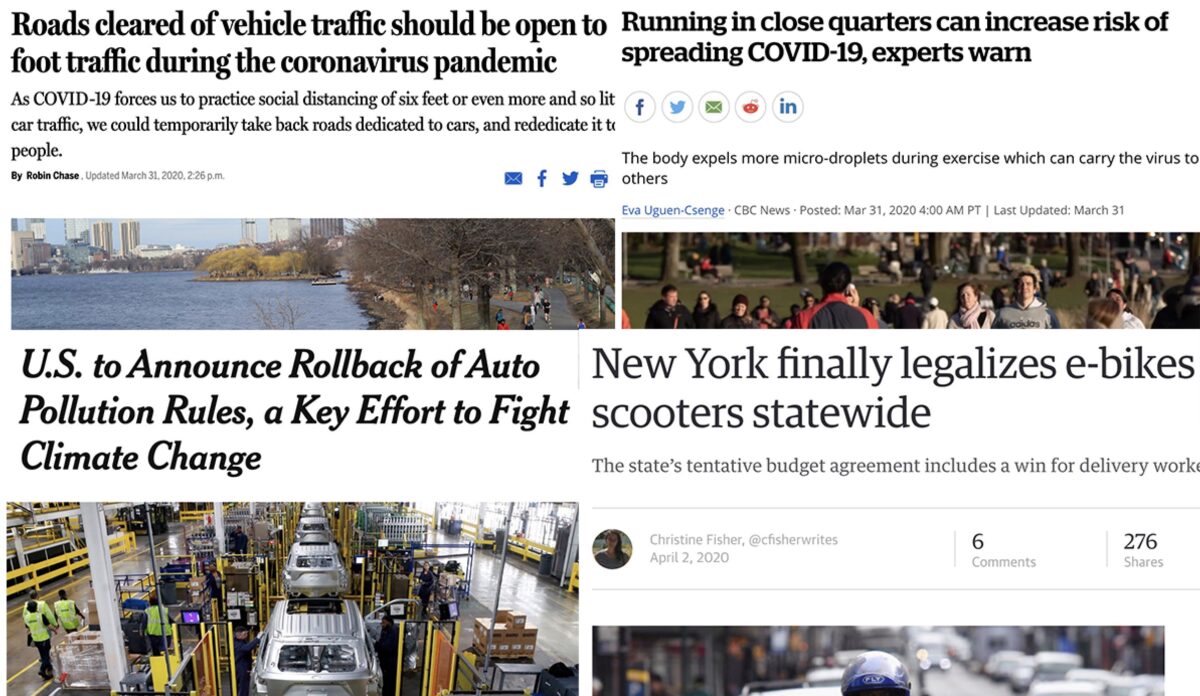
Welcome to the week.
Here are the most noteworthy items our community came across in the past seven days…
Portland’s “green dream” deferred: Curbed took a deep dive into Portland’s planning and transportation work and realized we’ve been resting on laurels for years and have not lived up to our proud legacy of change-making.
Bike shops should be closed: An experienced bike shop employee and former pro mountain biker makes the case that essential workers don’t need bikes, so deeming shops essential is not a risk we should take.
Quiet streets: By far the biggest story in our world this past week was all the calls for re-purposing street space away from driving and towards walking, biking and rolling. Here’s an idea for creating a network of “quiet streets” which are basically beefed-up neighborhood greenways that would work in dense urban areas.
Spreadsheet tracks street changes worldwide: University of North Carolina Researcher Tabitha Combs has created a database on all the cities around the globe that are changing street use policies in the name of social distancing and/or public health concerns.
***
SPONSORED: You can win great prizes and support a pump track in Wilsonville thanks to a grassroots fundraising effort by Willamette Valley Cyclists.
***
Even drivers think it makes sense: Not only does Car & Driver have a level-headed article about using street space for walkers and rollers, a poll at the bottom of their article shows that 75% of their readers think less space for driving is a good trade-off for space for walking.
The wrong rollback: In a bid to boost the economy, Trump will loosen auto fuel standards, a move that will permit cars to emit nearly a billion tons more carbon dioxide than allowable under current regulations.
Thanks to Trump: Early research suggests airborne particles created by auto emissions (among other things) might be linked to higher COVID-19 rates because the virus spreads easier in the dirty air (and/or it strikes people with smog-related lung problems harder).
Advertisement
Open streets in Denver: The Mayor of Denver, Colorado said he’ll ban driving on four streets in order to create more space for people to get outdoors while maintaining a healthy distance from one another.
E-bikes now legal: In what’s being hailed as a big win for delivery workers, New York has finally legalized electric bikes statewide.
A few cones: Temporary bike lanes in New York City made with a few signs and orange cones show that it doesn’t take much to change how streets are used.
Too close for COVID: All over the globe people are realizing that crowded carfree spaces are not just unfair, they are also a public health hazard.
Empty streets, crowded paths: The co-founder of Zipcar wrote in the Boston Globe that due to overcrowded on paths and trails, “We could temporarily take back roads dedicated to cars, and rededicate it to people.”
Tying COVID to the climate: Chicago activist Courtney Cobbs says the change in transportation behaviors we’re seeing right now is a chance to, “transform our transportation system” in a way that makes our planet healthier for future generations.
From the front lines: New York City has the worst virus outbreak and the best transportation advocates. Transportation Alternatives shares a simple guide to how bicycling can help cities cope with COVID-19.
Less distraction: Finally some good news from the car industry: Designers of one of Honda’s new models have decided to go away from the touchscreen trend in order to minimize driver distraction.
— Jonathan Maus: (503) 706-8804, @jonathan_maus on Twitter and jonathan@bikeportland.org
— Get our headlines delivered to your inbox.
— Support this independent community media outlet with a one-time contribution or monthly subscription.

